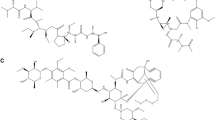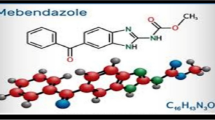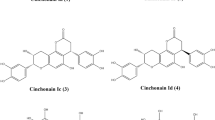Abstract
In a series of studies on the search for new antitumor and antimetastatic substances from the natural medicinal plants of the Umbelliferae family, we previously reported that chalcone derivatives isolated from Angelica keisekei roots have antitumor and antimetastatic activities. In the present study, we examined the effects of a chromone glucoside cnidimoside A isolated from Cnidium japonicum whole plants on tumor growth and tumor metastasis in colon 26-bearing mice. Cnidimoside A (50 mg/kg, twice daily) significantly inhibited tumor growth and final tumor weight compared to the growth in vehicle-treated colon 26-bearing mice (control). Furthermore, the number of mice with abdominal invasion of tumors was also reduced by orally administered cnidimoside A (50 mg/kg, twice daily). In this study, the CD8+ T Cell- and interferon (IFN)-γ-positive cell numbers in the small intestine in the colon 26-bearing mice were significantly reduced compared with those in the normal mice, but the natural killer (NK)-positive cell number did not differ significantly between the normal and colon 26-bearing mice. The CD8+ T-, NK and IFN-γ-positive cell numbers in the small intestine were significantly increased by orally administered cnidimoside A (50 mg/kg, twice daily) compared to those in vehicle-treated colon 26-bearing mice. In conclusion, it seems likely that the antitumor and antimetastatic actions of cnidimoside A may be partly associated with the stimulation of immune response in the small intestine.



Similar content being viewed by others
References
Kimura Y, Baba K (2003) Antitumor and antimetastatic activities of Angelica keiskei roots, Part 1: isolation of an active substance, xanthangelol. Int J Cancer 106: 429–437
Kimura Y, Taniguchi M, Baba K (2004) Antitumor and antimetastatic activities of 4-hydroxyderricin isolated from Angelica keiskei roots. Planta Med 70:211–219
Baba K, Kawanishi H, Taniguchi M, Kozawa M (1994) Chromone glucoside from Cnidium japonicum. Phytochemistry 35:221–225
Kimura Y, Okuda H (2001) Resveratrol isolated from Polygonum cuspidatum root prevents tumor growth and metastasis to lung and tumor-induced neovascularization in Lewis lung carcinoma-bearing mice. J Nutr 131:1844–1849
Kimura Y, Sumiyoshi M (2005) Antitumor and antimetastatic actions of eicosapentaenoic acid ethylester and its by-products formed during accelerated stability testing. Cancer Sci 96:441–450
Folkman J (2006) Angiogenesis. Annu Rev Med 57:1–18
Folkman J (2006) Antiangiogenesis in cancer therapy—endostatin and its mechanisms of action. Exp Cell Res 312:594–607
Folkman J (2007) Is angiogenesis an organizing principle in biology and medicine? J Predatr Surg 42:1–11
Folkman J, Klagsbrun M (1987) Angiogenic factors. Science 235:442–447
Klagsbrun M, D’Amore PA (1991) Regulators of angiogenesis. Annu Rev Physiol 53:217–239
Folkman J, Shing Y (1992) Angiogenesis. J Biol Chem 267:10931–10934
Hock H, Dorsch M, Kunzenforf Y, Quin Z, Diamanstein T, Blanskenstein T (1993) Mechanisms of rejection induced by tumor cell-targeted gene transfer of interleukin 2, interleukin4, interleukin 7, tumor necrosis factor, or interferon γ. Proc Natl Acad Sci USA 90:2774–2778
Hung k, Hayashi R, Lafond-Waker A, Lowebstein C, Pardoll D, Levisky H (1998) The central role of CD4+ T cell in the antitumor immune response. J Exp Med 188:2357–2368
Segal BM, Glass DD, Sgevach EM (2002) Cutting edge: IL-10-producing CD4+ T cells mediated tumor rejection. J Immunol 168:1–4
Colomno HP, Forni G (1994) Cytokine gene transfer in tumor inhibition and tumor therapy: where are we now? Imuno Today 15:48–51
Ma H-L, Whitters MJ, Konz RF, Senices M, Young DA, Grusby MJ, Collins M, Dunussi-Joannopoulos K (2003) IL-21 activates both innate and adaptive immunity to generate potent antitumor responses that require perfolin but are independent of IFN-γ. J Immunol 171:608–615
Iigo M, Kuhara T, Ushida Y, Sekine K, Moore MA, Tsuda H (1999) Inhibitory effects of bovine lactoferrin on colon carcinoma 26 lung metastasis in mice. Clin Exp Metastasis 17:35–40
Wang W-P, Iigo M, Sato J, Sekine K, Adachi, Tsuda H (2000) Activation of intestinal mucosal immunity in tumor bearing mice by lactoferrin. Jpn J Cancer Res 91:1022–1027
Markovic SN, Murasko DM (1991) Role of natural killer and T-cells in interferon induced inhibition of spontaneous metastases of the B16F10L murine melanoma. Cancer Res 51:1124–1128
Lasek W, Feleszko W, Golab J, Stoklosa T, Marczak M, Darbrowska A, Malejczyk M, Jakobisiak M (1997) Antitumor effects of the combination immunotherapy with interleukin-12 and tumor necrosis factor α in mice. Cancer Immunol Immunother 45:100–108
Acknowledgments
This work was supported by grant-in-aid for Scientific Research on Priority Area (No. 17035059 and 18032504; A representative: Yoshiyuki Kimura) and Scientific Research (C) (No. 18590654; A representative: Yoshiyuki Kimura) from The Ministry of Education, Culture, Sports, Science and Technology of Japan.
Author information
Authors and Affiliations
Corresponding author
Rights and permissions
About this article
Cite this article
Kimura, Y., Sumiyoshi, M., Taniguchi, M. et al. Antitumor actions of a chromone glucoside cnidimoside A isolated from Cnidium japonicum . J Nat Med 62, 308–313 (2008). https://doi.org/10.1007/s11418-008-0242-3
Received:
Accepted:
Published:
Issue Date:
DOI: https://doi.org/10.1007/s11418-008-0242-3




